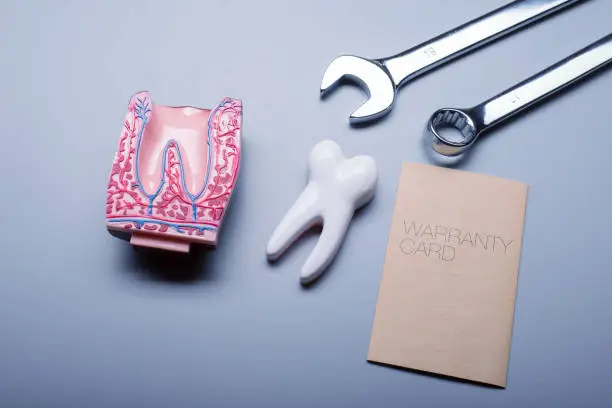One of the surest and most durable methods to replace lost teeth is by using the dental implant, which restores the function and the appearance. But just as with a big investment in your health, patients are always interested to see what sort of protection they get. And that is where dental implant warranties come in. By offering patients peace of mind, these warranties are intended to ensure that their implant is supported in case of any issues. But not every warranty is created equal-coverage may differ by a wide range depending on the provider.
Others provide general coverage which can cover repairs or replacement of the device whilst others carry hidden clauses or stringent provisions which can leave patients with unexpected costs. It is better to know exactly what is covered, what is not covered and what you should do to keep your warranty intact and save you the pain of paying a lot of money to discover that you have been lied to.
Understanding Dental Implant Warranties
Dental implants are designed to be durable, which does not imply they cannot cause complications. This is the reason why most dentists and manufacturers provide warranties – so that customers can have confidence that their money is not being wasted. But not every warranty is the same. Others are generally wide in scope, though some have a high level of restrictions or unspoken exclusions. Knowing the dental implant warranty mechanism will guide you to make informed choices about your dental treatment by knowing what to expect, preventing unexpected situations, and understanding the warranty mechanism.
What a Typical Dental Implant Warranty Includes
Nearly all dental implant warranties insure the integrity of the actual implant or what is commonly known as the titanium post that has been inserted into the jaw. This implies that in case of an implant failure caused by a defect in the material or manufacturing process, the implant can be changed without any cost. Other warranties also cover the abutment and the crown, but are typically covered at a shorter duration than the implant body. A typical warranty can be between five years and lifetime, but the fine print can often dictate otherwise.
Differences Between Manufacturer and Provider Warranties
There are typically two sources of Implant warranty, which are the manufacturer and your dental provider. A warranty provided by a manufacturer will guarantee the defects of the product itself, i.e. whether the implant is of a good quality. On the other hand, a warranty by the provider is concerned with the location and result of the surgery. It implies that the warranty of the provider can be implemented to replace or repair complications that arise because of technique. Ideally, patients are the beneficiaries of both types of cover.
Duration of Coverage and Common Terms to Know
Different manufacturers of implants, and even the dentist themselves, can have vastly different warranty durations. In other instances, a lifetime warranty on the implant itself (durability and strength) may be offered to patients, but only the crown (the visible part of the restoration) may be warrantied five to ten years. There might be conditions attached to other warranties, including that patients must have regular dental checkups, professional cleanings, or adhere to certain care instructions in order to hold on to the warranty.
Limited warranty, conditional coverage and pro-rated replacement are common terms found in fine print that can significantly affect what ends up being covered. Knowing this information before your treatment is a way of being sure of exactly what level of protection you have and can contribute to save you from hidden costs in the future.
What’s Usually Not Covered by Implant Warranties
Though dental implant warranty can be a great source of peace of mind, it does not cover all potential problems. Some of the many policies are meant to cover defects in the implant or restoration itself, yet in many cases not including problems that arise due to lifestyle habits, accidents or neglect. It is equally important to know what is not included as well as what is to help you make an informed decision regarding your long-term oral health.
Neglect, Poor Oral Hygiene, or Lifestyle-Related Failures
In the event, a dental implant fails because of lack of proper dental care, or because of poor maintenance or other lifestyle cases like smoking, then chances are that it is not covered by warranty. These kinds of failures are thought to be avoidable and have nothing to do with the quality or stability of the implant itself. Due to this, many warranties have clear measures that patients must adhere to proper oral care procedures at home, including daily brushing and flossing, and visit a dentist regularly to have their teeth cleaned and examined by a dentist.
Failure to do these duties can nullify the warranty, and the patients are liable to pay the entire sum to repair or replace the items. Knowing these factors makes it very important to continue taking care of them not only to preserve your investment but also to make sure that your dental implant will be a success in the long term.
Damage from Accidents or Trauma
Implants that are damaged by external forces, like a sports injury or car accident, are not usually the subject of warranties. Although the implant can be very strong, it is not unbreakable and the external force is not covered. Supplemental insurance could be a superior protection to athletes or persons who face a high risk of trauma.
Issues with Surrounding Teeth or Gum Health
Although the implant is very strong and well-positioned, issues with teeth around it or gum disease can cause complications. Cavities, periodontal disease or bone loss around the implant site may compromise the support structures and long-term success. Since these issues relate to the general state of oral health and not the implant, they are not often addressed in implant warranties. This is why it is important to keep up with regular dental health care, including professional teeth cleaning, regular check-ups, and regular home care. You not only take care of your natural smile, but also, by keeping the gums and surrounding teeth healthy, you are also ensuring the stability and longevity of your investment in implants.
Questions to Ask Before Getting Dental Implants
Dental implants are a big commitment, and a really exciting move towards a restored smile. Always make sure that you pose the right questions before proceeding, to ensure that you are well informed about the process, costs, risks and long-term care involved. Knowing will make you feel more confident and ensure that your treatment fits your needs best.
Is There a Written Warranty or Just Verbal Assurance?
Never commit to dental implant treatment without a written guarantee. However, verbal assurances of your dentist might be encouraging, but they do not hold the same level of importance as written commitments and are hard to enforce in the future in case of problems. Written warranty is more clear and legal, indicating precisely what is covered and what is not, and how long the coverage lasts. It should also state any requirements you must fulfill to keep the warranty-like a regular checkup or any routine maintenance you are supposed to perform. This is because with this information on paper you should know exactly what you are going to get and it helps to avoid misunderstandings in the future.
Are Follow-Up Visits Required to Maintain Warranty?
In most cases, the warranty comes with a condition that a patient has to visit his/her follow-up appointment because the check-ups are crucial in the success of the implant in the long run. In these visits, your dentist can ensure that the implant is healing well, examine potential early signs of complications, and perform professional cleanings to maintain the implant and the rest of your teeth. Missing these visits might appear innocuous, but it could actually nullify your warranty- even though the actual implant placement was done correctly and has no defects. Follow-up care, in addition to protecting your coverage, protects your overall oral health.
Will My Insurance Affect or Void the Warranty Terms?
Dental insurance and implant warranties are separate entities, but it is prudent to enquire how they can work together in your particular case. Others do not cover any warranty that an insurance plan is already covering part of the repair or replacement, and others will cover any warranty with or without the insurance being involved. This is better clarified beforehand so that you are well aware of what to expect and so that in case of any future hitches, there are no surprises.
Maximizing the Lifespan of Your Dental Implants
Dental implants are made to last decades, but the life of the implant is determined by how well they are maintained. Although the implant post itself is very stable, the gums and bone around it require constant support to ensure everything stays in place. By maintaining the right habits, such as good oral care, frequent visits to the dentist, and overall healthy lifestyle habits, you will be able to safeguard your investment and have a smile that you can proudly show for many years to come.
Proper Daily Oral Care to Prevent Implant Failure
Brushing your teeth is the easiest tip to ensure you get the most out of your dental implant and maintain your warranty. This involves brushing twice a day, flossing around the implant and application of antibacterial mouth rinses on occasion.
Why Regular Checkups Matter for Long-Term Success
Regular examinations enable your dentist to detect the early signs of a problem like inflammation of the gums, loss of bone or loosening of the crown before it escalates into more severe issues. On these visits, your dentist can also complete professional cleanings, minor adjustments, and provide advice on how to better your home care routine. In addition to taking care of your mouth, these routine visits can act as evidence that you have adhered to the necessary maintenance protocol, which is frequently required to maintain your dental implant warranty valid and enforceable.
Managing Habits Like Grinding and Smoking
Bruxism (grinding or clenching of teeth) may also reduce the life of your implant. To help protect the implant, dentists frequently prescribe nightguards. On the same note, smoking limits blood circulation, slows down healing and increases chances of failing the implant. There are numerous warranties that specifically do not cover when smoking is a contributing factor.
Frequently Asked Questions (FAQs)
1. Do all dental implants come with a warranty?
Not all dental implants come with a warranty, but most reputable manufacturers and dental providers offer some form of coverage to give patients peace of mind. These warranties can range from a few years to a lifetime, depending on whether they apply to the implant post, the crown, or both. The scope of coverage often differs as well, with some warranties being very comprehensive and others limiting protection to defects only. Because of these variations, it’s essential to carefully review the written warranty before starting treatment.
A clear understanding of what’s included, what’s excluded, and how long the coverage lasts will help you make an informed decision. If no warranty is provided at all, that can be a red flag and may warrant reconsidering your choice of provider. Choosing a dentist who stands behind their work is an important step in ensuring your long-term oral health and confidence.
2. What’s the difference between a product warranty and a provider warranty?
A product warranty typically covers the dental implant device itself, guaranteeing that it is free from defects in materials or manufacturing. This means that if the implant post or abutment fails due to a factory-related issue, the replacement is usually covered. On the other hand, a provider warranty focuses on the placement and clinical outcome of your implant, addressing complications that may arise from the surgical or restorative procedure.
Having both types of coverage offers the most complete protection—ensuring you’re safeguarded against product flaws as well as potential treatment challenges. This dual warranty approach not only provides peace of mind but also reflects a strong commitment from both the manufacturer and your dental provider to stand behind their work.
3. Can I transfer my warranty if I move or change dentists?
Some manufacturer warranties are transferable, meaning that if you move or change dentists, the warranty still applies because it covers the implant device itself rather than the provider. This can be especially helpful for patients who relocate frequently or expect to move in the future. In contrast, most provider warranties are not transferable, since they depend on follow-up care, maintenance, and oversight from the dentist who performed the procedure.
Without that continuity of care, the provider cannot guarantee results, which is why the warranty typically ends when treatment transfers to another office. For patients considering dental implants, it’s important to ask in advance whether the warranty is transferable and under what conditions. Clarifying this detail before treatment begins can help prevent frustration and unexpected gaps in coverage later on.
4. What voids a dental implant warranty?
Dental implant warranties often come with clear guidelines, and failing to follow them can make your coverage invalid. Poor oral hygiene, untreated gum disease, or neglecting to attend scheduled follow-up visits are some of the most common reasons warranties are voided. Lifestyle habits such as smoking or ignoring your dentist’s care instructions may also disqualify you from protection. In addition, most warranties do not cover trauma or damage caused by accidents, since these are considered outside of the provider’s control.
This means that even if the implant itself was sound, failure to meet these conditions can leave you paying out of pocket for repairs or replacement. To avoid this, it’s important to maintain excellent daily oral care, stay consistent with checkups, and follow all provider recommendations closely. Staying compliant not only protects your implant but also ensures your warranty remains active for as long as possible.
5. Is a lifetime warranty on dental implants realistic?
Some companies promote lifetime warranties on dental implants, but it’s important to read the fine print. In most cases, this type of coverage applies only to the titanium implant post itself, not to the crown or abutment, which typically have shorter warranty periods. Even for the implant post, the warranty often comes with conditions such as attending annual checkups, maintaining good oral hygiene, and providing documentation of regular professional care. Missing these requirements can void the coverage entirely.
While lifetime warranties can provide long-term peace of mind, they don’t always guarantee full protection against every issue you may face. Patients should carefully review the written terms and ask their provider to explain any exclusions or limitations. Taking time to understand these details ensures you know exactly what’s covere, and what’s not, before making your decision.
Conclusion and Call to Action
A dental implant is not just a medical procedure—it’s a long-term investment in your health, appearance, and confidence. While warranties provide reassurance, the details often matter more than the headline promises. Knowing what’s covered, what isn’t, and how to protect your coverage helps you avoid hidden gaps that could cost you in the future.
If you’re considering dental implants, take the time to review warranty options carefully with your dentist. Ask direct questions, request written documentation, and clarify your responsibilities to keep the warranty valid. The more informed you are, the more confident you’ll feel about your decision.
Ready to explore dental implants with full confidence? Schedule a consultation with Graham Park Dental that offers clear warranty terms and personalized care.


